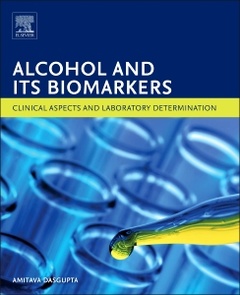Alcohol and Its Biomarkers Clinical Aspects and Laboratory Determination Clinical Aspects and Laboratory Determination Series
Auteur : Dasgupta Amitava

Alcohol and Its Biomarkers: Clinical Aspects and Laboratory Determination is a concise guide to all currently known alcohol biomarkers, their clinical application, and the laboratory methods used to detect them. Pathologists can use this resource to understand the limitations and cost factors associated with each method for determining certain alcohol biomarkers. In addition, interferences in these determinations are discussed, so that clinicians can understand the causes of falsely elevated biomarkers and pathologists and laboratory scientists can potentially eliminate them. The book focuses on the analytical methods used to detect alcohol in blood and urine, the limitations of alcohol determination using enzymatic methods, and the differences between clinical and forensic alcohol measurement. Chapters also cover cutting-edge alcohol biomarkers for potential use.
- Alcohol: Use, Abuse and Issues with Blood Alcohol Level
- Genetic Aspect of Alcohol Metabolism and Drinking Behavior
- Measurement of Alcohol Levels in Body Fluids and Transdermal Alcohol Sensors
- Alcohol Biomarkers: An Overview
- Liver Enzymes as Alcohol Biomarkers
- Mean Corpuscular Volume, and Carbohydrate Deficient Transferrin as Alcohol Biomarker
- Beta-hexosaminidase, Acetaldehyde-Protein Adducts and Dolichol as Alcohol Biomarkers
- Direct Alcohol Biomarkers: Ethyl Glucuronide, Ethyl Sulfate, Fatty Acid Ethyl Esters and Phosphatidylethanol
- Less commonly Used Alcohol Biomarkers and Proteomics in Alcohol Biomarker Discovery
- Genetic Markers of Alcohol Use Disorder
Amitava Dasgupta received his Ph. D in chemistry from Stanford University and completed his fellowship training in Clinical Chemistry from the Department of Laboratory Medicine at the University of Washington School of Medicine at Seattle. He is board certified in both Toxicology and Clinical Chemistry by the American Board of Clinical Chemistry. Currently, he is a tenured Full Professor of Pathology and Laboratory Medicine at the University of Kansas Medical Center and Director of Clinical Laboratories at the University of Kansas Hospital. Prior to this appointment he was a tenured Professor of Pathology and Laboratory Medicine at the University of Texas McGovern medical School from February 1998 to April 2022. He has 252 papers to his credit. He is in the editorial board of four journals including Therapeutic Drug Monitoring, Clinica Chimica Acta, Archives of Pathology and Laboratory Medicine, and Journal of Clinical Laboratory Analysis.
- Focuses on the analytical methods used for detecting alcohol in blood and urine along with the pitfalls and limitations of alcohol determination using enzymatic methods
- Explains the difference between clinical and forensic alcohol measurement
- Includes a brief overview of the benefits of consuming alcohol in moderation and the hazards of heavy drinking
Date de parution : 02-2015
Ouvrage de 312 p.
19x23.3 cm
Mots-clés :
% carbohydrate-deficient transferrin; 5-hydroxytryptophol; Acetaldehyde-hemoglobin adduct; Acetylcholine; Alanine transaminase; Alcohol biomarker; Alcohol consumption; Alcohol dehydrogenase; Alcohol determination; Alcohol metabolism; Aldehyde dehydrogenase; Aspartate transaminase; Blood alcohol determination; Breath analyzer; Carbohydrate-deficient transferrin; Dolichol; Ethyl glucuronide; Ethyl sulfate; False positive; Fatty acid ethyl esters; French paradox; Genes encoding dopamine receptors; Genes encoding serotonin receptors; Glutamate receptor; Health benefits of moderate drinking; Heat-stable enzyme; Interferences; Mean corpuscular volume; Phosphatidylethanol; Polymorphism; Proteomics; Sialic acid index of apolipoprotein J; Total sialic acid; Transdermal sensors; β-Hexosaminidase; γ-Glutamyl transpeptidase; γ-glutamyl transferase



